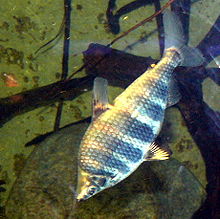- Abramites hypselonotus
-
Abramites hypselonotus 
Abramites hypselonotus Scientific classification Kingdom: Animalia Phylum: Chordata Class: Actinopterygii Order: Characiformes Family: Anostomidae Genus: Abramites Species: A. hypselonotus Binomial name Abramites hypselonotus
(Günther, 1868)[1]Abramites hypselonotus, or the marbled headstander, is a member of the family Anostomidae of the order Characiformes. Under normal fish classifying rules you would gather from its upturned mouth and long streamlined body that the marbled headstander is a surface dweller. In reality marbled headstanders, like all headstanders, inhabit the middle and lower portions of the aquarium.[2] In the wild, head standers are often found face down, tail up in narrow vertical rocky fissures.[3]
Contents
Geographical distribution and habitat
The marbled headstander generally inhabits streams and rivers of the Orinoco and Amazon river systems.[4] Headstanders in general inhabit very fast flowing waters in rocky stretches of river.[3]
Physical description
Marble headstanders are generally identified by their pointed snout, diamond shaped body, brown markings on pelvic fin, wavy dark brown bands, and a dark line at the base of the caudal peduncle.
The marble headstanders full adult size is roughly 5" (13 cm).[4]Distinguishing between sexes
Unknown
Diet and feeding behaviour
The marble headstander is a predominately herbivorous fish and as such should be given a high vegetation diet. In addition to processed food, they will readily accept, and probably enjoy lettuce leaves, and peas. They will also accept mosquito larvae and bloodworms.[3]
Aquarium care
In the aquarium the marble headstander is generally a peaceful inhabitant despite its (extremely distant) relation to the pirahna. They are completely docile as juveniles both towards other fish and members of their own species. Once older keep either a single headstander or a group of seven or more in a tank as they tend to fight amongst themselves in smaller groups. They are still generally peaceful towards other fish.
Keep marble headstanders in a rocky, heavily planted aquarium with many cracks and crevices for them to explore. Note: if there is not enough vegetation in its diet, it will devour aquarium plants. On the other hand you can use this to your advantage if you want to set up a "self-sustaining aquarium" (Please keep in mind this is not an easy task. Do not just throw a bunch of plants in and think it will be fine).[3]Temperature, pH, and salinity
These fish can tolerate a pH from 6-7.5, but prefer slightly acidic water. They like soft water ranging from 2-15 dH, and require a temperature of 73-82°F (23-28°C).[5]
References
- ^ http://www.itis.gov/servlet/SingleRpt/SingleRpt?search_topic=TSN&search_value=163179
- ^ Eyewitness Handbooks Aquarium Fish The visual guide to more than 500 marine and freshwater fish varieties, by Dick Mills copyright 1993 page 84
- ^ a b c d The Ultimate Encyclopedia of Aquarium Fish & Fish Care, by Mary Bailey & Gina Sandford copyright 1999 page 187
- ^ a b Eywitness Handbooks Aquarium Fih The visual guide to more than 500 marine and freshwater fish varieties, by Dick Mills copyright 1993 page 84
- ^ http://fish.mongabay.com/curimatidae.htm
Categories:
Wikimedia Foundation. 2010.
